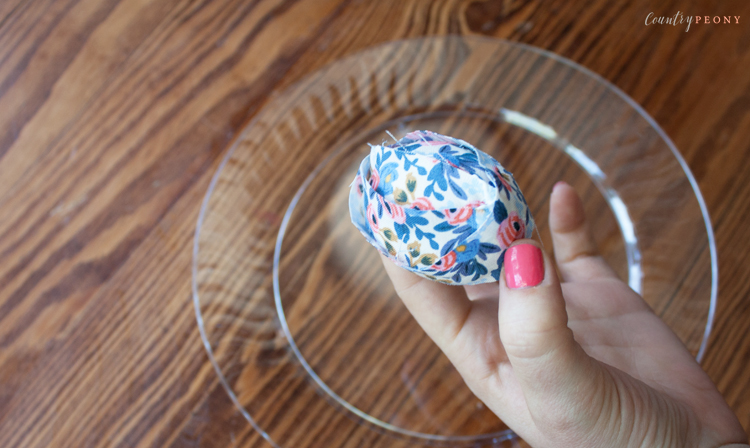DIY Floral Easter Eggs Wreath
Festive, seasonal wreaths are a fun way to personalize and add a warm welcome to your entryway. For this Spring wreath, I wanted to add a festive flair with a nod to nature. So I used the same cute fabric by Rifle Paper Co. and the same technique from my DIY Fabric Pumpkins post to create a simple, yet charming Easter egg wreath.
I love using grapevine as the backdrop because it is a fun nod to nature as it reminds me of a bird's nest. While nestling cute eggs on top in a random pattern make the wreath whimsical and sweet. Another plus to using a grapevine wreath is you can add as many or as few eggs as you prefer, because the grapevine creates a nice, natural backdrop.
You can customize this wreath by adding your own favorite small print fabric and choosing your own egg pattern. Also, the great thing about this project is that it isn't very expensive, yet it will last for many Spring seasons to come.
*Tips:
Choose fabric with smaller prints so you don't have to worry about matching up the patterns.
Keep hand wipes or a wet towel nearby to clean fingers in between applications. The mod podge process can get very messy and sticky. The key to a successful fabric egg is clean fingers that won't stick to the fabric during application.
Prep your area with a disposable plate and paper so that the mod podge doesn't stick to your work station.
*This post contains affiliate links. For more information, please see my disclosures here.
To make your own floral Easter egg wreath, you will need:
Step 1: With a very sharp knife, cut the fabric into 1 inch strips. *My mother taught me to have a separate pair of scissors for fabric so that I don't dull the shears with my other craft projects.
Step 2: Since your egg size may be different from mine, take a strip of fabric and measure the circumference of the egg with the fabric. Then cut the fabric strip so that it goes around the egg once. I cut my strips at 7 inch lengths since my eggs are small.
Create 6 strips per egg.
Step 3: With a disposable plate underneath to protect your work surface and a wet towel nearby to keep your fingers clean, apply one even layer of mod podge with the small foam brush to the plastic egg.
Step 4: Add the strips of fabric around the egg one at a time. Apply a small dab of mod podge to the top and bottom of the edge in between each fabric strip application. You should use 6 fabric strips, and they should overlap each other so that the egg is completely covered. The key to a smooth fabric egg surface is to keep your fingers clean and to pull the fabric very tight.
Step 5: Once all of your fabric is attached to the plastic egg, apply one even layer of mod podge to the top of the fabric.
Then use your fingers to smooth down the fabric edges and any fabric frays.
Determine how many eggs you will need for your wreath, then repeat steps 1-5. I used 13 eggs for my 14 inch wreath.
Step 6: Let the eggs dry. About 1-2 hours.
Step 7: Once the eggs are dry apply an even (not too thick) topcoat of mod podge to the eggs.
Step 8: Once the eggs are dry from the second coat of mod podge, plug in your hot glue gun. Then determine placement of your eggs onto your wreath.
Hot glue the eggs onto the wreath. Once you attach the egg to the wreath, continue to hot glue the egg onto the wreath by adding the glue to the parts of the wreath where the egg meets.
Step 9: Clean up the hot glue whiskers (mess) from the wreath.
Step 10: Hang and enjoy your creation!














